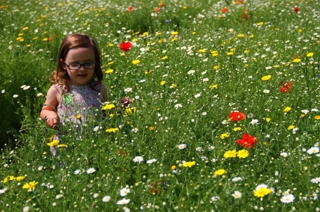Wildflower Seed Helps Business Bloom
- 2nd Jul 2022
As we celebrate National Meadows Day on 2nd July, and a UK summer full of wildflower meadows, the South West Partnership for Environmental and Economic Prosperity Programme (SWEEP) is publishing two new reports - highlighting their partnership with The Lost Gardens of Heligan and the innovative Business Case for wildflowers seed production in Cornwall and the Isles of Scilly this has produced.
Wildflower meadows are one of the rarest habitats in the UK today. Since the 1930s, 97% of them have been lost and flower-rich grassland now only cover a mere 1% of the UK’s land area.
Along with climate change and the harmful effects of pesticides and disease, this loss of flower-rich habitat - as a result of land use change and the intensification of agricultural - is one of the main reasons for the dramatic decline in pollinator populations.
This disturbing global trend is of significant concern to us all. 1,400 species of pollinators and other insects rely on for wildflower meadows for their survival and these pollinators play a vital role in pollinating the food we eat, maintaining levels of biodiversity and contributing to our economy. It is estimated that the global economic value of crop pollination services is £120billion, and a value to the UK alone of £690million each year[1].
Various initiatives are now underway to raise awareness of this problem. National Meadows Day is one these, and takes place on the first Saturday of July each year. With a series of events and activities running across the country, this provides an opportunity to celebrate and raise awareness of our magnificent, but dwindling meadows, and put out a call for action to reverse the decline.
Some of those taking action are Dr Grace Twiston-Davies and Prof Juliet Osborne from the University of Exeter, who lead SWEEP’s Policy for Pollinator team. One of the strands of their ground-breaking work in the South West of the UK is exploring business-led solutions that can operate at scale to help address the decline in pollinator species, whilst also delivering wider benefits for the environment, the economy and human health and wellbeing.
The SWEEP team has worked in close collaboration with Alasdair Moore, Head of Gardens and Estate at the Lost Gardens of Heligan, to create a Business Case for wildflower seed production in Cornwall and the Isles of Scilly that supports the local biodiversity, economy and society.
The Business Case draws on Alasdair’s experience of establishing a stunning 15 acre annual meadow site that provides not only ample forage for pollinators and a unique attraction boosting visitor wellbeing, but proven potential to generate £18,000 worth of seed per year.

Working with SWEEP on the wildflower project and business case has enabled us to deliver something that is both scientifically robust and very special. It’s rare to be able to create something that delivers so much – that’s beautiful, enhances biodiversity, is meaningful to people, strengthens relationships with the people we work with, and is financially productive. It all fits perfectly with the ethos of the Heligan estate
Alasdair Moore, Head of Gardens and Estates, The Lost Gardens of Heligan
Created in 2019 as an annual wildflower meadow of Corn marigold, Corn cockle, Cornflower and Poppy, the Lost Gardens of Heligan Wildflower Project has provided hundreds of kilograms of seed to the National Wildflower Centre at the Eden Project to help with their habitat regeneration projects.
The Heligan Wildflower project is already inspiring other individuals and businesses to explore opportunities for growing wildflowers as part of a holistic business model for profit, people and planet such as Cusgarne Organic Farm and Trewithen Estate in Cornwall.
To ensure that this inspiring work continues, the SWEEP Policy for Pollinator team has recently created a new social enterprise company called ‘The Wildflower Collective’ and this foundational wild flower work is now being taken forward in a project funded by the Halpin Trust.
We hope that by showcasing successful business led solutions to this decline in pollinator populations, we can help extend the benefits of our work in the South West for business, bees and society.
To find out more please about our work please go to the SWEEP website where you can –
Download The Lost Gardens of Heligan Wildflowers Business Case and Case Study resources
And find out about our Wildflower Collective.
If you’re interested to know more, do take a look at our new short film (below this article) about the Lost Gardens of Heligan Wildflower experience.
If you’d like to buy your own Heligan wildflower seed and read more about the Heligan Wildflower Project, please click here.

